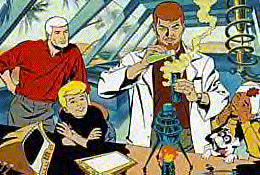 |
| Skelleton of a T-Rex Looks out over the Legislature Building from the NC Science Museum across the Street |
I’ve known about this for a few months, but only took a close look the other day after a meeting with some folks at our state department of education (NCDPI). It’s called, Future-Ready Students for the 21st Century, and this list of goals for North Carolina schools is, in my opinion, a much needed about-face for those who go5vern education in my state.
If you’ve been reading my blog for a while, you know that I deeply respect the professional staff at our department of ed. That anything good comes out of any state political agency attests to the intelligence, professionalism, and persistent drive of people who work there. I spent six years with NCDPI, and simply didn’t have the strength of character to keep working there, when there always seemed to be to many political reasons not do do good.
I want to share the enormous and often demoralizing constraints that face people who work for state and federal departments of ed — as a preamble to the comments I am making about this document.
It is also important for you to know that North Carolina was, to my knowledge, the first state to embrace school accountability. It was 1995, the year I left the agency. I would tell you my recollection of those days, but it would make you want to sit down and cry.
So, Goal one… NC public schools will produce globally competitive students.
Well there’s that ‘C’ word again. Why can’t we recognize that globalization is not happening because countries are competing with each other, but because we are cooperating.
The sub goals are… Every student excels in rigorous and relevant core curriculum that reflects what students need to know and demonstrate in a global 21st Century environment, including a mastery of languages, an appreciation of the arts, and competencies in the use of technology.
I’m encouraged by inclusion of the arts in the first statement of the first goal. Making and appreciation of the arts such a prominent part of our schooling won’t be so easy — but it could be enormously fun. I was also pleased to see inclusion of technology, though we’ve been testing 8th graders on their technology competencies for almost ten years, and it hasn’t gotten us any closer to the 21st century — in my opinion.
Every student’s achievement is measured with an assessment system that informs instruction and evaluates knowledge, skills, performance, and dispositions needed in the 21st Century.
This sounds to me like we move assessment back into the classrooms, and away from the state legislature. I’m sure I’m missing something though. I shouldn’t be so glib, but I believe that teachers are prepared, equipped, and the best people to be assessing student learning. That some teachers are not prepared should not be solved by institutionalizing assessment.
Every student will be enrolled in a course of study designed to prepare them to stay
ahead of international competition.
Alright, so what does this look like? I just deleted a bunch of my text, realizing I was becoming a bit negative, and that is not what I want to do here. So I’ll hold my tongue for a bit.
Every student uses technology to access and demonstrate new knowledge and skills
that will be needed as a life-long learner to be competitive in a constantly changing
international environment.
Woe! My eyes just popped out. We are not talking about learning technology skills, but USING technology and information skills to become self-teachers. I could see this becoming the central hub of what is happening in schools to help students to become future-ready.
It is absolutely essential, however, that seeing this happen will require a skillfully orchestrated convergence of
- Connectivity,
- Professional development,
- Instructional tech staffing, and
- Convenient access to ICT for every teacher and student (and I’m not talking hand-helds).
Every student has the opportunity to graduate from high school with an Associates
Degree or college transfer credit.
A lot of high schools are looking at partnerships with local community colleges as a way to add significant learning opportunities for students, and to align opportunities to local needs. I think that this is a good thing, though I suspect that we are just scratching the surface for finding ways to efficiently provide addition non-traditional learning opportunities for our students.
The next major goal is… NC public schools will be led by 21st Century professionals.
Sub goal one … Every teacher will have the skills to deliver 21st Century content in a 21st Century context with 21st Century tools and technology that guarantees student learning.
Again, my eyes are bugging out with excitement. But what kind of crowbar are you going to use to pry loose teachers and administrators who are so cemented into the motions of school as usual? Mere professional development will be so utterly insufficient to this task that I would prefer that the term not even be used in this conversation. Past that, I think that the opportunities for making teachers and administrators 21st century professionals are so exciting and so compelling, that ripples might extend into our universities and draw more bright and ambitious students into schools of education. This kind of school is a place where people will want to be — teacher and learner.
Every teacher and administrator will use a 21st Century assessment system to inform instruction and measure 21st Century knowledge, skills, performance, and dispositions.
This is almost too obvious to be mentioned, though I understand why it is. but the new assessment must be much more than technological. It must be cultural.
Every education professional will receive preparation in the interconnectedness of the world with knowledge and skills, including language study.
I think that this is absolutely essential as long as we are not asking teachers to take Spanish or Chinese. Adults do not learn foreign languages the way that children do. That said, I think that there is much that we can do to fully globalize our curriculum and to make interconnected another word for the classroom.
Every education professional will have 21st Century preparation and access to ongoing high quality professional development aligned with State Board of Education priorities.
OK, this is another one that had to be said. But we need to completely redefine professional development. it needs to be much more casual, ubiquitous, tied as much to the everyday needs of teachers as to SBE priorities. I’d say, also, that the State Board of Education probably needs a healthy, casual, ongoing, and intense dose of PD to keep up with the world we are preparing our children for..
Every educational professional uses data to inform decisions.
This is implied in so much that has already been said and too obvious to be mentioned explicitly. Yet, I understand why it is. State assessment has not done much to inform teachers with data. It needs to happen, and perhaps it needs to be said for that reason.
There are three more goals, that I will address in a future blog.
- NC public school students will be healthy and responsible.
- Leadership will guide innovation in NC public schools.
- NC public schools will be governed and supported by 21st Century systems.
Image Citation:
MPD, “Legislate This!.” MPD’s Photostream. 22 Jan 2006. 28 Dec 2006 <http://flickr.com/photos/mpdehaan/89937175/>.
Technorati Tags: warlick education ncdpi future



 The entire information landscape has dramatically changed in the last few years, an idea that many of the Future-Ready Students‘ goals certainly reflect. However, is there an opportunity here to make the entire state education system future-ready. Rather than handing the plan down to the future, we might, in today’s new information environment, dance together into the future. Rather than reshaping schools as a sermon, reshape them as a conversation, among communities and professional educators at all levels.
The entire information landscape has dramatically changed in the last few years, an idea that many of the Future-Ready Students‘ goals certainly reflect. However, is there an opportunity here to make the entire state education system future-ready. Rather than handing the plan down to the future, we might, in today’s new information environment, dance together into the future. Rather than reshaping schools as a sermon, reshape them as a conversation, among communities and professional educators at all levels.
 There’s not a lot that is new in the article, but we have another serious researcher to pay attention to.
There’s not a lot that is new in the article, but we have another serious researcher to pay attention to. Microsoft’s Dan’l Lewin posts in his
Microsoft’s Dan’l Lewin posts in his  This in from the trickle of e-mail that has hit my mail box over the past very busy couple of days. Bonnie Bracey1 posted the story over
This in from the trickle of e-mail that has hit my mail box over the past very busy couple of days. Bonnie Bracey1 posted the story over